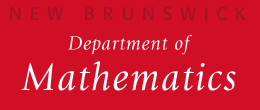The goals of the Ph.D. program in Mathematics are (i) to train students at an advanced level on scholarship, through extensive course work and original research in one of our department's many fields of expertise leading to a dissertation, and (ii) to train students to become competent and effective teachers, so as to prepare students to assume positions of leadership in research, teaching, and service in education, industry, and government.
Learning Goal 1 for students: Attain rigorous and in-depth training in broad fields of mathematics, and acquire research skills in preparation for thesis.
Assessment of student achievement of Goal 1:- Grades in graduate courses.
- Written qualifying exam after one year of course studies, assessing depth and breadth of knowledge.
- Oral qualifing exam after two and a half years of course studies and independent reading, to acquire background knowledge and research skills in preparation for thesis.
- Review by faculty of student progress, with close advising and mentoring.
- Graduate students must pass a foreign language proficiency test in either French, German, or Russian before they can file for Ph.D. candidacy. The purpose of this test is for the student to demonstrate his or her ability to use technical publications, written in the language, in their research.
- Organize an intensive 3-day introductory workshop for entering students, to provide review and to fill in gaps in some background expected in standard courses, and to provide an idea of the research being done by current students for their dissertations.
- Organize an additional two week "boot camp" for entering students, with lectures by faculty and daily afternoon problem sessions. These are designed to help students learn core material which they may not have been exposed to at their undergraduate institution.
- Assign initial faculty mentors to all entering students.
- Require all Ph.D. students to take, or have the training equivalent to, five core courses in Mathematics.
- Arrange help for students who have initial academic difficulty, either in individual or group settings.
- Hold an annual meeting to review the academic and teaching progress of all Ph.D. students in the program.
- Provide periodic review of curricular offerings and assessment tools.
Learning Goal 2 for students: Engage in and conduct original research.
Assessment of graduate student achievement of Goal 2:- Preparation and discussion of Ph.D. dissertation proposal.
- Assessment of quality of Ph.D. dissertation:
- Critical reading of dissertation by committee of graduate faculty members together with a committee member from outside our graduate program.
- Public defense of dissertation.
- Submission and acceptance of peer-reviewed articles and conference papers based on the dissertation.
- Achievement of students as evidenced by professional placement, selection for conference presentations, peer-reviewed publications, and individual grant attainment.
- Organize Faculty Research Perspective seminars to invite faculty members to give expository talks to discuss the research field, methodology, and open problems in the speaker's field.
- Provide advice to students for finding a research advisor.
- Provide mentoring and funding for student-run seminars.
- Provide opportunities to present research and receive feedback.
- Maintain adequate funding levels through the research phase. To accomplish this, the Program carefully manages its support resources and admissions of new students, applies for extenal grants, and encourages individual faculty members to apply for grants to support students.
Learning Goal 3 for students: To become competent and effective teachers
Assessment of graduate student achievement of Goal 3:- The Mathematics Department sends instructors or other faculty members to visit TAs' classrooms to provide evaluation and feedback.
- Instructors are asked to provide end-of-the-term evaluation of their TAs.
- The Graduate and Undergraduate Programs of the Mathematics Department review teaching evaluations of all TAs at the end of each semester.
- The Mathematics Department organizes TA training seminars for all TAs aimed at helping TAs develop their teaching skills. This seminar involves about 22 hours of participation from the student, and normally ends with the student conducting a practice recitation section which is videotaped and critiqued by an experienced teacher.
- The graduate faculty holds an annual meeting to review the academic and teaching progress of all Ph.D. students in the program. The department makes two Teaching Excellence Awards to TAs every semester.








